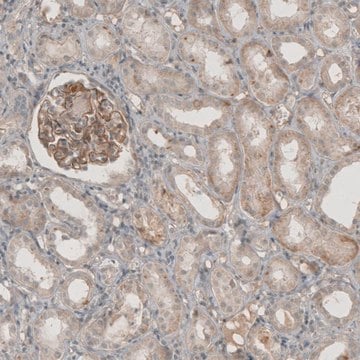SAB4200757
Anti-PLA2R antibody, Mouse monoclonal
clone 12-6-5, purified from hybridoma cell culture
Synonym(e):
Anti-180 kDa secretory phospholipase A2 receptor, Anti-C-type lectin domain family 13 member C, Anti-M-type receptor, Anti-PLA2-R, Anti-PLA2R, Anti-Secretory phospholipase A2 receptor
About This Item
Empfohlene Produkte
Biologische Quelle
mouse
Qualitätsniveau
Antikörperform
purified from hybridoma cell culture
Antikörper-Produkttyp
primary antibodies
Klon
12-6-5, monoclonal
Form
buffered aqueous solution
Mol-Gew.
~180 kDa
Speziesreaktivität
human
Konzentration
~1 mg/mL
Methode(n)
flow cytometry: suitable
immunoblotting: 1-2 μg/mL using partial recombinant human PLA2R1 protein (predicted ~150kDa)
immunofluorescence: suitable
immunohistochemistry: suitable
Isotyp
IgG2b
UniProt-Hinterlegungsnummer
Versandbedingung
dry ice
Lagertemp.
−20°C
Posttranslationale Modifikation Target
unmodified
Angaben zum Gen
human ... PLA2R1(22925)
Verwandte Kategorien
Allgemeine Beschreibung
Immunogen
Anwendung
- immunoblotting
- immunofluorescence
- flow Cytometry
- immunohistochemistry
Biochem./physiol. Wirkung
Physikalische Form
Not finding the right product?
Try our Produkt-Auswahlhilfe.
Lagerklassenschlüssel
10 - Combustible liquids
WGK
WGK 3
Flammpunkt (°F)
Not applicable
Flammpunkt (°C)
Not applicable
Analysenzertifikate (COA)
Suchen Sie nach Analysenzertifikate (COA), indem Sie die Lot-/Chargennummer des Produkts eingeben. Lot- und Chargennummern sind auf dem Produktetikett hinter den Wörtern ‘Lot’ oder ‘Batch’ (Lot oder Charge) zu finden.
Besitzen Sie dieses Produkt bereits?
In der Dokumentenbibliothek finden Sie die Dokumentation zu den Produkten, die Sie kürzlich erworben haben.
Kunden haben sich ebenfalls angesehen
Unser Team von Wissenschaftlern verfügt über Erfahrung in allen Forschungsbereichen einschließlich Life Science, Materialwissenschaften, chemischer Synthese, Chromatographie, Analytik und vielen mehr..
Setzen Sie sich mit dem technischen Dienst in Verbindung.












